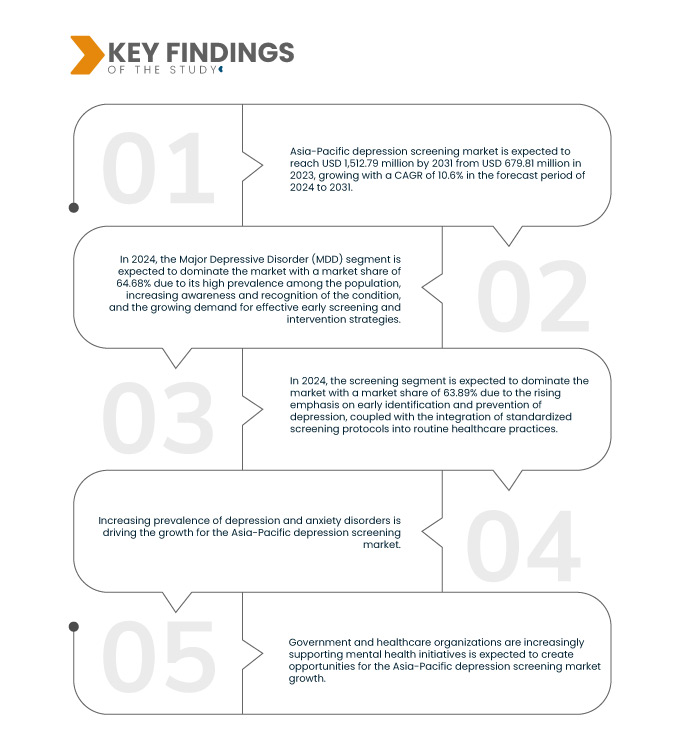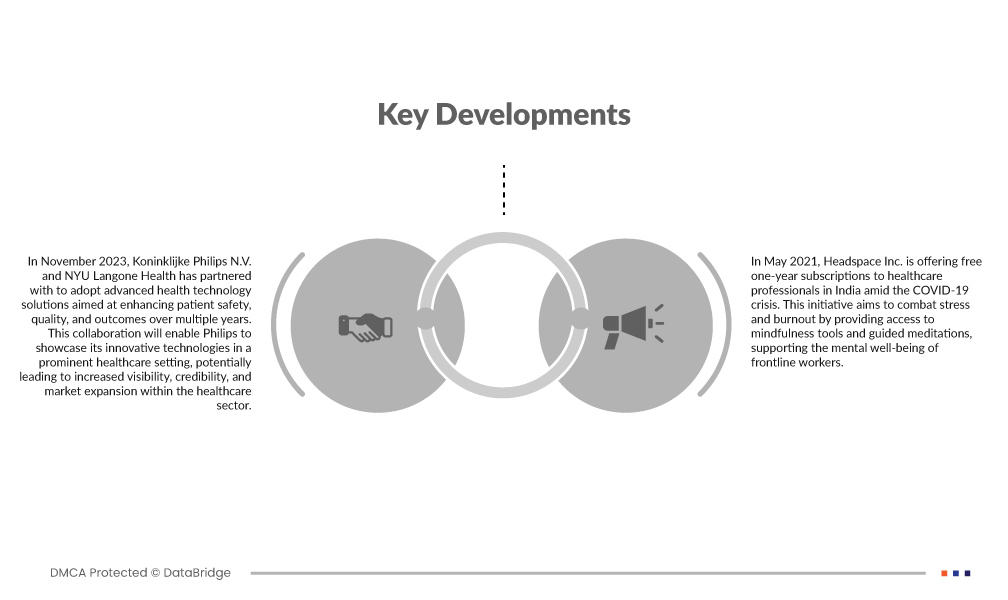La prévalence croissante de la dépression et des troubles anxieux dans la région Asie-Pacifique constitue un moteur important pour le marché du dépistage de la dépression. En effet, l'augmentation des cas de troubles mentaux accentue le besoin de solutions diagnostiques accessibles et efficaces. Les facteurs de stress socio-économiques, l'urbanisation rapide et les pressions constantes de la modernisation contribuent à l'incidence croissante de ces troubles. De plus, l'évolution des dynamiques sociales et la sensibilisation accrue à la santé mentale incitent les individus à rechercher un diagnostic et un soutien, stimulant ainsi la demande de services de dépistage de la dépression . Les gouvernements et les organismes de santé de pays comme le Japon, la Corée du Sud et l'Inde prennent conscience de la crise de santé mentale et intègrent le dépistage de la dépression dans leurs initiatives et politiques de santé publique afin de favoriser une intervention et un traitement précoces. Grâce aux progrès des technologies de santé numérique, le dépistage est devenu plus accessible via les applications mobiles, les plateformes de télésanté et les consultations en ligne, élargissant ainsi la portée même aux zones reculées ou mal desservies. Par conséquent, le marché du dépistage de la dépression en Asie-Pacifique connaît une croissance portée par les exigences de santé publique et l'amélioration des connaissances en santé mentale, répondant ainsi au besoin croissant de diagnostics rapides et efficaces de la dépression.
Accéder au rapport complet sur https://www.databridgemarketresearch.com/reports/asia-pacific-depression-screening-market
Data Bridge Market Research analyse que le marché du dépistage de la dépression en Asie-Pacifique devrait atteindre 1 512,79 millions USD d'ici 2031, contre 679,81 millions USD en 2023, avec un TCAC de 10,6 % au cours de la période de prévision de 2024 à 2031.
Principales conclusions de l'étude
Progrès dans la technologie de dépistage de la dépression
Les progrès technologiques en matière de dépistage de la dépression stimulent considérablement le marché du dépistage de la dépression en Asie-Pacifique, améliorant la précision, l'accessibilité et l'efficacité des évaluations de santé mentale. Des innovations telles que l'intelligence artificielle (IA) et les algorithmes d'apprentissage automatique sont intégrées aux outils de dépistage pour analyser plus efficacement les données des patients et permettre des diagnostics plus rapides et plus précis. De plus, le développement des plateformes numériques et des applications mobiles a rendu le dépistage plus accessible, permettant aux individus d'effectuer des évaluations depuis leur domicile. Ces technologies permettent d'atteindre les populations mal desservies des régions reculées, réduisant ainsi les obstacles à l'accès et encourageant davantage de personnes à demander de l'aide. De plus, les services de télésanté sont de plus en plus adoptés, facilitant les consultations virtuelles intégrant le dépistage à un soutien professionnel, favorisant ainsi une intervention précoce. La collecte et l'analyse de données en temps réel simplifient non seulement le processus de dépistage, mais permettent également aux professionnels de santé de suivre l'évolution de la maladie. À mesure que ces avancées technologiques évoluent, elles jouent un rôle crucial dans la transformation du dépistage de la dépression en Asie-Pacifique, améliorant ainsi les résultats en matière de santé mentale et augmentant le potentiel de croissance du marché.
Portée du rapport et segmentation du marché
Rapport métrique
|
Détails
|
Période de prévision
|
2024 à 2031
|
Année de base
|
2023
|
Années historiques
|
2022 (Personnalisable 2016-2021)
|
Unités quantitatives
|
Chiffre d'affaires en millions USD
|
Segments couverts
|
Type de dépression (trouble dépressif majeur (TDM), trouble dépressif persistant (TDP) et autres), diagnostic (dépistage et tests de laboratoire), utilisateur final (hôpital, cliniques spécialisées, centres de recherche médicale et autres)
|
Pays couverts
|
Chine, Japon, Inde, Corée du Sud, Australie, Indonésie, Thaïlande, Singapour, Taïwan, Malaisie, Vietnam, Philippines et reste de l'Asie-Pacifique
|
Acteurs du marché couverts
|
Koninklijke Philips NV (Pays-Bas), Apple Inc. (États-Unis), Google (États-Unis), Lifetrack Medical Systems (Singapour), Genetic Technologies Limited (Australie), Headspace Inc. (États-Unis), Pankhtech India Private Limited (Inde) et Pearson (Inde), entre autres
|
Points de données couverts dans le rapport
|
En plus des informations sur les scénarios de marché tels que la valeur marchande, le taux de croissance, la segmentation, la couverture géographique et les principaux acteurs, les rapports de marché organisés par Data Bridge Market Research comprennent également une analyse approfondie des experts, l'épidémiologie des patients, l'analyse du pipeline et le cadre réglementaire.
|
Analyse des segments
Le marché du dépistage de la dépression en Asie-Pacifique est segmenté en trois segments notables en fonction du type de dépression, du diagnostic et de l'utilisateur final.
- Sur la base du type de dépression, le marché du dépistage de la dépression en Asie-Pacifique est segmenté en trouble dépressif majeur (TDM), trouble dépressif persistant (TDP) et autres.
En 2024, le segment des troubles dépressifs majeurs (TDM) devrait dominer le marché du dépistage de la dépression en Asie-Pacifique.
En 2024, le segment des troubles dépressifs majeurs (TDM) devrait dominer le marché avec une part de marché de 64,68 % en raison de sa forte prévalence au sein de la population, de la sensibilisation et de la reconnaissance croissantes de la maladie et de la demande croissante de stratégies efficaces de dépistage et d'intervention précoces.
- Sur la base du diagnostic, le marché du dépistage de la dépression en Asie-Pacifique est segmenté en tests de dépistage et de laboratoire.
En 2024, le segment du dépistage devrait dominer le marché du dépistage de la dépression en Asie-Pacifique
En 2024, le segment du dépistage devrait dominer le marché avec une part de marché de 63,89 % en raison de l’importance croissante accordée à l’identification précoce et à la prévention de la dépression, associée à l’intégration de protocoles de dépistage standardisés dans les pratiques de soins de santé de routine.
- En fonction de l'utilisateur final, le marché du dépistage de la dépression en Asie-Pacifique est segmenté entre hôpitaux, cliniques spécialisées, centres de recherche médicale et autres. En 2024, le segment hospitalier devrait dominer le marché avec une part de marché de 46,87 %.
Acteurs majeurs
Data Bridge Market Research analyse les principaux acteurs du marché opérant sur le marché du dépistage de la dépression en Asie-Pacifique, notamment Koninklijke Philips NV (Pays-Bas), Apple Inc. (États-Unis), Google (États-Unis) et Lifetrack Medical Systems (Singapour).
Évolution du marché
- En novembre 2023, Koninklijke Philips NV et NYU Langone Health se sont associés pour adopter des solutions technologiques de santé avancées visant à améliorer la sécurité, la qualité et les résultats des patients sur plusieurs années. Cette collaboration permettra à Philips de présenter ses technologies innovantes dans un environnement de soins de santé de premier plan, ce qui pourrait accroître sa visibilité, sa crédibilité et son expansion commerciale dans le secteur de la santé.
- En mai 2021, Headspace Inc. offre des abonnements gratuits d'un an aux professionnels de santé en Inde, dans le contexte de la crise de la COVID-19. Cette initiative vise à lutter contre le stress et l'épuisement professionnel en donnant accès à des outils de pleine conscience et à des méditations guidées, favorisant ainsi le bien-être mental des travailleurs de première ligne.
Analyse régionale
Géographiquement, les pays couverts par le rapport sur le marché du dépistage de la dépression en Asie-Pacifique sont la Chine, le Japon, l'Inde, la Corée du Sud, l'Australie, l'Indonésie, la Thaïlande, Singapour, Taïwan, la Malaisie, le Vietnam, les Philippines et le reste de l'Asie-Pacifique.
Selon l'analyse de Data Bridge Market Research :
La Chine devrait dominer le marché du dépistage de la dépression en Asie-Pacifique
La Chine devrait dominer le marché en raison de sa population importante, de la prévalence croissante des troubles de santé mentale et des initiatives gouvernementales croissantes visant à améliorer la sensibilisation à la santé mentale et l’accès aux services de dépistage.
Pour plus d'informations sur le rapport sur le marché du dépistage de la dépression en Asie-Pacifique, cliquez ici : https://www.databridgemarketresearch.com/reports/asia-pacific-depression-screening-market













